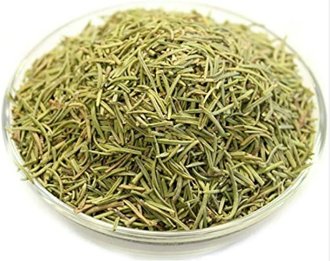Selection and storage
Rosemary is commonly cultivated as a garden herb to ensure easy access to its fresh leaves for culinary purposes.
 |
| Dry rosemary herb leaves. |
When purchasing from the herb store, opt for fresh rosemary instead of the dried variety for its superior quality and subtle flavor. Dried rosemary, on the other hand, imparts a stronger and more pungent taste, making it a favorite for savory meat dishes. Look for fresh leaves with deep green coloration, devoid of any spots or yellowing.
To preserve freshness, store fresh rosemary in the refrigerator within plastic bags. Dried rosemary should be stored in an airtight container, ideally in a cool, dark, and dry location, where it can maintain its freshness for several months.
Culinary Applications
To ensure cleanliness, wash or rinse fresh leaves under cold running water for a few minutes to eliminate any dirt or pesticide residues. To preserve its fragrance and flavor, the herb is typically incorporated into recipes during the final stages of cooking, preventing the loss of essential oils due to prolonged cooking and evaporation.
Here are some serving tips:
-
Both fresh and dried rosemary leaves are integral to Mediterranean cuisine, enriching a variety of recipes.
-
This herb enhances the flavor of salads, soups, baked vegetables, and meat dishes.
-
Rosemary complements tomatoes, aubergine, potato, and zucchinis (courgettes) wonderfully. Finely chopped fresh leaves elevate the taste of delectable sautéed rosemary potatoes.
-
In the Mediterranean region, rosemary tea enjoys popularity as a flavorful beverage.
Medicinal Applications of Rosemary
-
Rosmarinic acid, a natural polyphenolic antioxidant present in rosemary, exhibits antibacterial, anti-inflammatory, and antioxidant properties. Besides rosemary, other traditional herbs like sage, peppermint, oregano, and thyme also contain significant levels of rosmarinic acid.
-
Rosemary oil, distilled from the flowering tops, contains volatile essential oils such as camphene, cineol, borneol, bornyl acetate, and other esters. These compounds possess tonic, astringent, diaphoretic, and stimulant properties.
-
Externally, rosemary herbal oil is used as a rubefacient to alleviate painful conditions such as gout, rheumatism, and neuralgia.
-
Applications of rosemary herb extracts on the scalp are known to stimulate hair follicles and aid in preventing premature baldness. It serves as an effective remedy for preventing dandruff and scalp irritation.
-
Rosemary tea is a natural remedy for nervous headaches, colds, and depression. (Medical disclaimer).
Safety profile
Consuming large amounts of rosemary herb during pregnancy may lead to abortion. Additionally, some individuals may experience allergic skin reactions to rosemary oil products in rare cases.
In excessive doses, rosemary has been associated with kidney dysfunction and may worsen pre-existing neurological conditions such as epilepsy and neuroses. Please refer to our Medical disclaimer for further information.
≺≺ Back to Herbs from Rosemary herb. Visit here for an impressive list of all varieties of herbs with complete illustrations of their nutrition facts and health benefits.
≺≺ Back to Home page.
Further Resources:
-
Stanford School of Medicine Cancer information Page- Nutrition to Reduce Cancer Risk.
-
Antimicrobial activity of Rosmarinus officinalis L.- PDF.
-
Rosemary- Herb Growing in South Africa-PDF.

